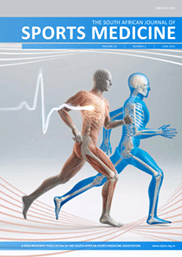Dietary supplements containing prohibited substances: A review (Part 1)
DOI:
https://doi.org/10.7196/SAJSM.552Abstract
Dietary supplements and chemical agents have been used for a number of decades among athletes striving to achieve increased strength and performance. This has led to a huge, growing market for the food supplement industry. The latter’s products are classified as ‘foods’ rather than drugs and are therefore free of the stringent requirements for registration of pharmaceuticals, i.e. no safety and efficacy data are required prior to registration. During the past decade, some dietary supplements have been shown to contain pharmaceutically active components not adequately identified on their package labels. These pharmaceuticals may have unintentionally entered the product or may have been intentionally added. Although the concentrations of these substances may be low and devoid of health or performance-enhancing effects, they may lead to positive doping tests. In Part 1 of this two-part review, a selection of the World Anti-Doping Agency-prohibited illegal stimulants, i.e. ephedrine, pseudoephedrine, sibutramine and methylhexaneamine, are discussed. Certain food supplement labels do mention the presence of natural sources of illegal stimulants, e.g. Ephedra sinica (ephedrine), but do not refer to the chemical entities of ephedrine and its analogues as such. The pharmacological adverse effects of stimulants, in particular those on the cardiovascular system, are briefly reviewed. Suggestions for avoiding these pitfalls are made.
Downloads
Downloads
Published
Issue
Section
License
Copyright (c) 2014 South African Journal of Sports Medicine

This work is licensed under a Creative Commons Attribution 4.0 International License.
The South African Journal of Sports Medicine reserves copyright of the material published. The work is licensed under a Creative Commons Attribution 4.0 (CC BY 4.0) International License. Material submitted for publication in the South African Journal of Sports Medicine is accepted provided it has not been published elsewhere. The South African Journal of Sports Medicine does not hold itself responsible for statements made by the authors.
How to Cite
- Abstract 874
- PDF 690
Metrics

- Citations
- Citation Indexes: 7
- Usage
- Full Text Views: 2576
- Abstract Views: 323
- Captures
- Readers: 32
- Mentions
- News Mentions: 1





.png)